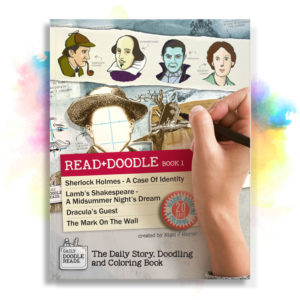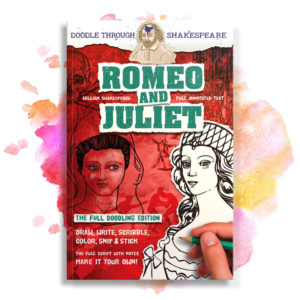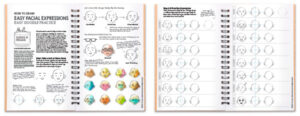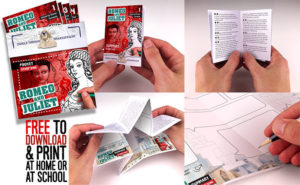
How to read Shakespeare? Lots of us find approaching Shakespeare quite scary. It’s completely understandable. Shakespeare wrote his plays over four hundred years ago, and so uses the language and ideas of his time. He didn’t write them to be read alone from printed books either, he wrote them to be performed live in front of thrill-seeking crowds.
When it comes around to sitting down to actually read Shakespeare it can feel extra challenging. But the rewards are great, and so finding your way in is the key. Remember that even today Shakespeare’s stories touch millions of people around the globe. There are good reasons for this. There is pleasure there for you too, it’s just waiting for your own discovery. These twelve top tips will help you find your way in.
Table of Contents
12 Choose a Play that Interests You
It’s always a good place to start! Shakespeare was writing for a hungry public, and so he covered lots of ground. If you are about to read Shakespeare for the first time then choosing the right play will help tremendously. Luckily variety is not a problem. I’d recommend starting with one of the most popular ones. Something like ‘Romeo and Juliet’, ‘Macbeth’, ‘A Midsummer Night’s Dream’, ‘Othello’ or ‘The Merchant of Venice’. Don’t jump in first with the mangled Roman bloodthirst that is ‘Titus Andronicus’ (unless of course that’s your very particular thing), nor perhaps with Shakespeare’s most notoriously difficult play ‘Timon of Athens’. Pick a genre and a subject that sounds appealing and then dive in.
There are some very good short summaries of the plays that you can read to help you choose. Meanwhile I’ve included a useful link that I can recommend at the end of this article.
11 Cosy Down with a Good Shakespeare Movie First

Many people first come to Shakespeare through a movie, and there are plenty of brilliant ones to choose from.
Cinema is a chance to see Shakespeare’s plays done differently. As with live theatre, directors, actors and designers work hard creating their own visions for the plays. Whilst there are many films that are inspired by Shakespeare’s stories (such as ’10 Things I Hate About You’ (1999) – based on ‘The Taming of the Shrew’), there are also many that offer Shakespeare’s original language and plot structure. However, if you’re following along with a play-script you may be surprised to find large bits are missing and scenes have moved around. It’s in the nature of film that things may be done differently than they are live on a stage.
If you are intending to read Shakespeare for study, there’s a lot to be said for watching more than one cinematic interpretation of the same play. A good example is ‘Romeo and Juliet’. Watch Baz Luhrmann’s turbo-charged 1996 version for a very different vision of the story than Franco Zeffirelli gives us in his romantic 1968 production. As you get to know a play, spotting those different approaches in character, mood and setting can be great fun, and often thought-provoking too.
10 Sneak in with a Scene-by-Scene Synopsis
Essential if you’re just starting out on your reading journey with Mr. Shakespeare. It’s no cheat to have a handy scene-by-scene synopsis to help you through. The main thing to remember here is that you want to enjoy the story as it unfolds. Read a scene of the play, and then if you find you needed some help, read its synopsis before moving on to the next scene. If at first you are really struggling, then read the scene synopsis before you take on reading the scene in the play. As you ease in, gradually you’ll find you need that extra help less and less.
9 Read Along with a Shakespeare Audio Book

Enjoy a more lively page-by-page experience and read Shakespeare alongside listening to an audio-book production. This will help you find your way through. Don’t get hung up on every difficult word or phrase, it will all begin to fit together and make sense as the play proceeds.
I’d recommend you choose a version of your play read by a full professional cast rather than a single narrator (although some very good solo readings do exist too). Listen to a sample first if you can, and hear if these are voices that work for you. That’s because audio productions vary greatly in approach and talent. We particularly like the Arkangel Shakespeare series – where all 38 plays are available in audio format performed by some truly fantastic actors, many of whom have worked with the prestigious Royal Shakespeare Company.
Listening as you read Shakespeare also helps you to pronounce some of those unexpected words, but more importantly will help you to discover how important pace and rhythm can be for fully understanding what’s being said.
8 Read Shakespeare Out Loud with Friends
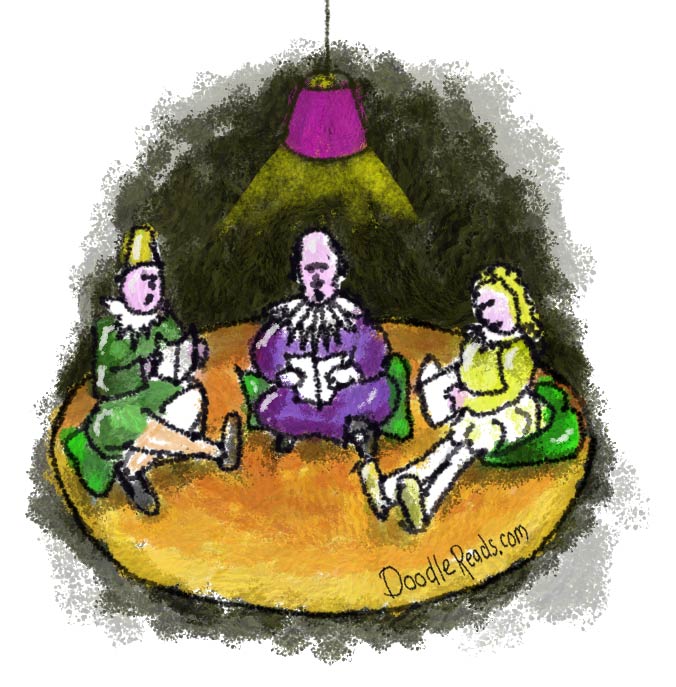
As mentioned right up top, Shakespeare didn’t write his plays for solitary book-reading. These stories were created to be spoken and heard.
There is nothing better than gathering a few friends or family members and reading as a group — and Shakespeare is just perfect for this. Get some snacks in, pour a glass of something nice, and get comfy.
Split up the roles how you wish, or simply read the lines of the play alternately around your group. That way everyone gets a go at being fierce like Macbeth, or head-over heels in love like Juliet. Don’t be judgemental, give it your best, and remember to have fun! You’ll learn from each other and probably surprise yourself too.
7 Listen to a Shakespeare Podcast
We love podcast listening. In case you don’t know – podcasts are episodes of audio series that you can download to your computer, phone or tablet for listening whenever you want.
There are some excellent podcasts to be found out there covering all the plays, their study, and performance, as well as insights into the author’s life and times.
A few great places to start listening are:
‘Shakespeare Unlimited‘ from The Folger Shakespeare Library in Washington. You’ll discover many enjoyable episodes covering a wide range of features from ‘Shakespeare’s Kitchen’ to ‘Playing Hamlet’ to ‘Hip Hop Shakespeare’. For a warm audio welcome from the good people at The Folger go to https://www.folger.edu/shakespeare-unlimited
‘No Holds Bard‘ the Shakespeare podcast they tell us that Shakespeare would have listened to! This energetic and hugely enjoyable ongoing podcast series includes the helpful ‘So You’re Going to See…’ episodes. These get you up to speed on individual plays, perfect for listening before ‘going to see’. Find it here at https://www.noholdsbard.com/
‘Such Stuff: The Shakespeare’s Globe podcast‘ takes you behind the scenes for a regular dip into the world of Shakespeare’s Globe on Bankside in London. Check it out at https://www.shakespearesglobe.com/discover/backstage/such-stuff-podcast/
6 Be not afraid of Shakespearean Language
To our ears Shakespeare’s language can seem strange and difficult at first. Even seasoned Shakespeare-goers can find it takes them a little while to ‘tune in’ at the beginning of a production, and the same is true when you read Shakespeare.
Don’t forget that these plays are human voices, just ones from a different era. They talk to us directly across the centuries from a time where environment, manners, sounds, sights and smells were often different to our own. But the core of what these characters are talking about — honestly, we still share very directly with them. Laughter, fear, anger, love, betrayal, envy, greed, pride, lust – all elements of the human condition – all as relevant to us now as the day they were first written.
At first don’t worry about every single word making sense to you. It will come; and as you progress you will get what’s going on without having to pause on every other line to look something up.
5 All the World’s a Stage – So See Shakespeare Live
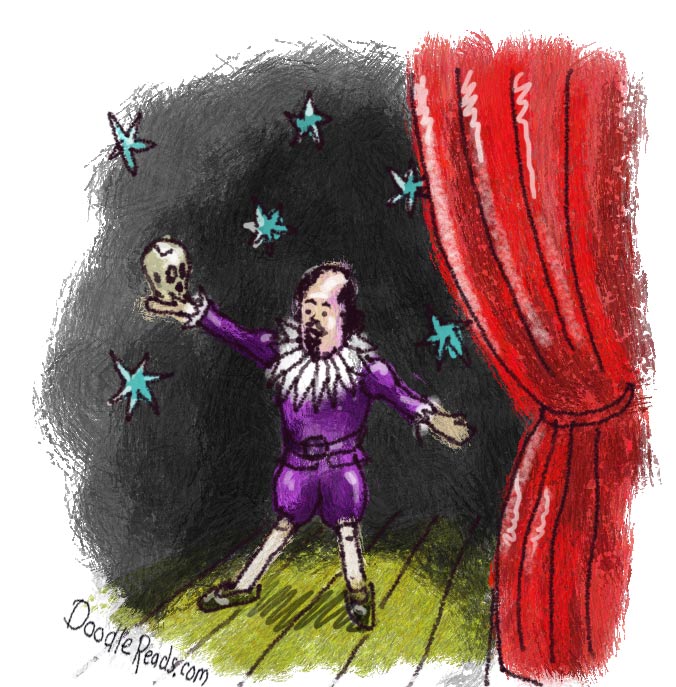
Nothing beats it. In my own opinion, seeing a good quality creative production is the best way to experience Shakespeare’s plays. But a word of caution, sitting through a bad production has been known to put people of the idea of Shakespeare for life! We shouldn’t have to pretend that all productions are good. As an exacting man of the theatre, I’m sure Shakespeare himself would have held strong opinions on the matter! So don’t be afraid to be choosy.
For that reason do some research first. Check out the reviews, ask people’s opinions and ensure your first outing to see Shakespeare live will be an enjoyable and memorable one. The famous companies are usually reliable for their quality and high values. Companies such as the Royal Shakespeare Company, and the Shakespeare’s Globe here in England. You’ll be able to learn who’s good in your part of the world. Don’t rule out some of the smaller scale productions either, they can be truly excellent too.
If getting to a theatre is difficult, check out and see if any productions are live-streaming to your local cinema. That’s often an excellent way to see live theatre productions you’d otherwise have to miss.
4 Keep Notes and Spill Your Thoughts
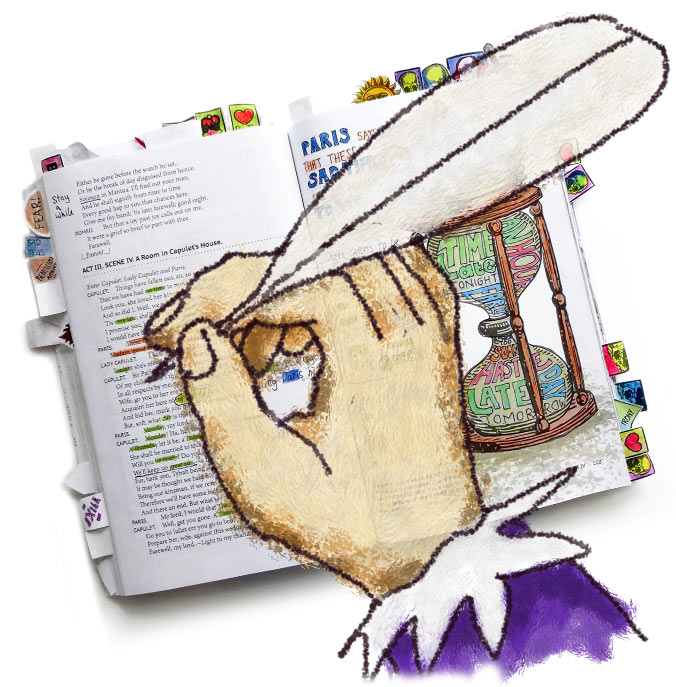
We are strong believers in making Shakespeare your own. He belongs to us all, and the magic of his writing is such that we can all find something relevant within.
As you read Shakespeare, make notes. Make notes on your thoughts and questions. Make notes on your ideas and on your understanding. Scribble in the margins, underline bits, fold the pages – make that copy as personal as you can.
It’s because we think this is so important that we have created the ‘Doodle Through Shakespeare‘ series. Inside these books you are totally encouraged to write, doodle, scribble, color and stick stuff all over the play as you read through.
No matter what level your writing or doodling skills, you will find this an excellent way to improve comprehension and recall, and more importantly it makes the whole experience such fun.
3 Get Some Background
“What’s past is prologue” says Antonio in ‘The Tempest’. He means that what has happened before influences what happens now.
Get a feel for the past as it connects to both the themes of Shakespeare’s stories and to his own times. This can immeasurably increase your understanding and enjoyment when you read Shakespeare. Even for a modern interpretation, knowledge of context and history rewards you with greater immersion and involvement.
Luckily there’s lots of background to discover here, and the area is an incredibly well-served one. There are excellent books, movies, podcasts and articles on all of these themes, and exploration of them need not be at all dry like a badly-taught history lesson!
So, did ‘Macbeth’ really bloody his hands in ancient Scotland? What might swordsmanship have meant to young Romeo’s 17th century mind? How did Shakespeare’s audiences first see his plays? Search, discover and enjoy.
As a couple of quick recommendations, and although it may not answer all of those specific questions – you might enjoy dipping into ‘The Friendly Shakespeare’ an enjoyable companion book by Norrie Epstein. Also Ben Crystal’s excellent book ‘Shakespeare on Toast’ does a brilliant job of breaking down the imagined barriers that surround Shakespeare.
2 Read Shakespeare with Pace & Rhythm
I said earlier that these are human voices from over 400 years ago, but honestly that’s not to say that people actually spoke like that in Shakespeare’s day.
Why? Well, because much of the plays’ writing is actually poetry; in other words ‘verse‘ rather than ‘prose‘. Prose, if you’re not sure, is the normal form of natural speech we use everyday. Consequently it does not have the set rhythmic structure of verse. Some characters in the plays speak prose, but more often you’ll find them speaking less-natural sounding verse.
The terms poetry and verse often make us think of something that rhymes, but it does not need to at all. Blank verse is a term used specially to describe verse where there is no rhyming structure. Blank verse is what you will encounter most when reading Shakespeare.
So what makes it blank verse as opposed to prose? Well, it’s essentially to do with rhythm, and the rhythm Shakespeare liked most has a name, it’s called iambic pentameter. It’s like a beat pattern in every line and sounds something like:
da DUM da DUM da DUM da DUM da DUM
Pentameter means five ‘measures’ of rhythm per line, and iambic means two beats to each of those measures (and also that the stress emphasizes on the second beat) . Again so:
Shall I compare thee to a summer’s day?
Shall I com pare thee to a summ er’s day?
da DUM da DUM da DUM da DUM da DUM
It’s worth knowing that what we will speak as a single sentence or phrase may be spread across several new lines of verse in the play. You don’t have to break up your speech by pausing on each new line, keep going until you get to some punctuation.
One last heads-up here – part of Shakespeare’s genius is the way he sometimes breaks these rules. He does this for dramatic effect, and not to merely mess with your mind just as you’re getting the hang of it!
1 Read Shakespeare and Get Creative
Don’t just read Shakespeare, get creative whilst you’re reading. It’s good for us all to find a creative outlet – for example research has shown that doodling and drawing quickly increases blood flow to the area of our brains that contain the reward centres. Fantastic! Hang on though, but what if you think you can’t draw at all? That’s not going to feel very rewarding is it? Well actually, that same research found that doodling rewards us all equally, no matter how much artistic talent you think you do or don’t have.
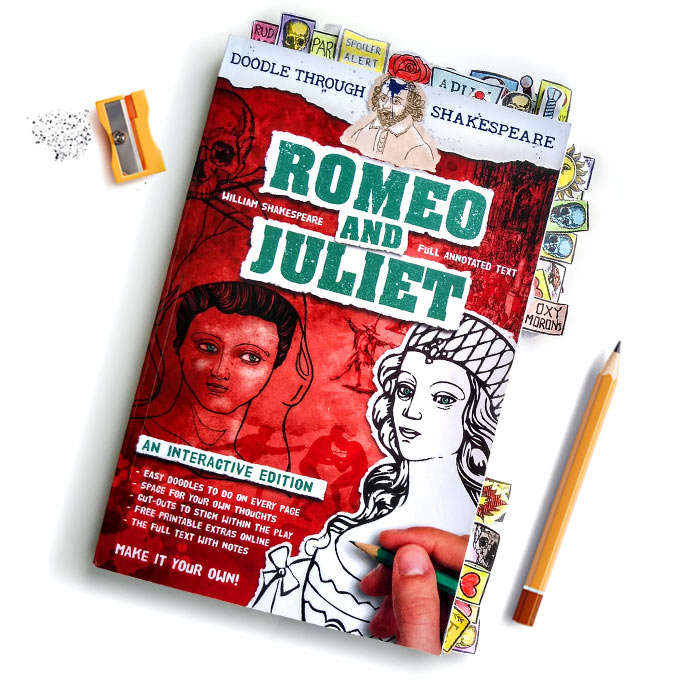
Getting creative as a response to your reading helps you feel more involved, and so keeps you keen on continuing. I’ve already mentioned the value of notes and scribbles, but you can do more. If you already have a creative talent or pastime, now’s the time to start connecting it to your reading. If not – now’s a good time to have a go! Maybe you paint? Try making a painting inspired by the play. Perhaps you’re a keen photographer – go looking for imagery that resonates to the story or the characters. Love cooking? Try inventing a meal that celebrates the scene you have just read. You get the idea!
We feel so strongly that creative activity can increase your enjoyment of reading Shakespeare, that we are working on a series of interactive books that encourage just that.
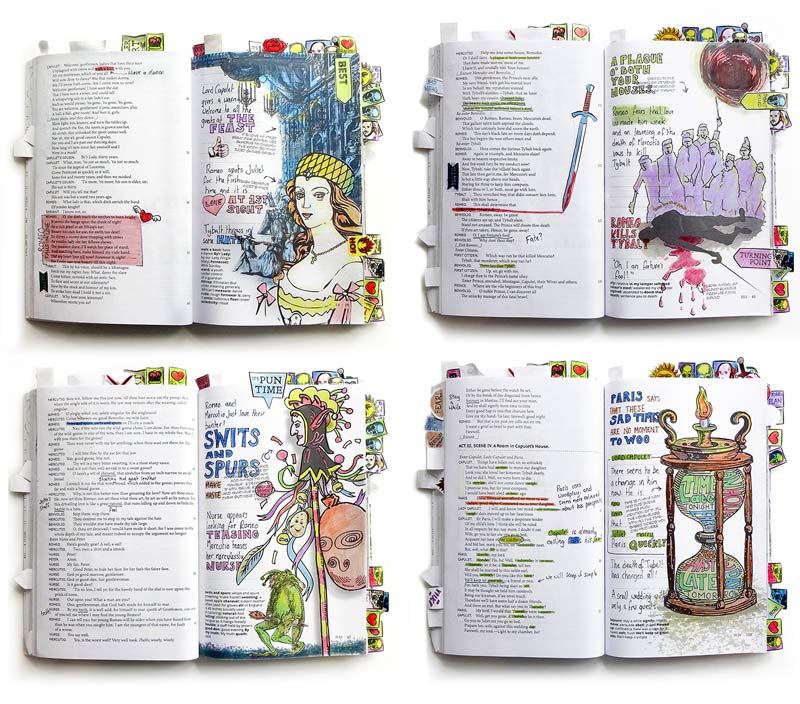
The ‘Doodle through Shakespeare’ series each contain not only the full text of the play, but also lots of themed doodling prompts with space to write, scribble, draw, snip, colour and stick stuff. It’s a book to fully customize, enjoy and make your own. And even if you don’t make a single mark of your own, it’s still a handsome illustrated edition with clearly laid out pages and lots of useful notes and annotations. We have already published ‘Romeo and Juliet: The Full Doodling Edition’ and have more titles coming soon. Subscribe if you would like to hear from us as new titles are published.
RESOURCES MENTIONED IN THIS POST
For some excellent summaries of all the plays visit:
http://shakespearequotesandplays.com/william-shakespeare-plays-complete-list/
Here are the links to the three podcasts mentioned in the post:
https://www.folger.edu/shakespeare-unlimited
https://www.noholdsbard.com/
https://www.shakespearesglobe.com/discover/backstage/such-stuff-podcast/
You can find more details of the Arkangel Shakespeare audiobook series on amazon.com from where they are also available to stream individually via audible.com
You can visit the site of the Royal Shakespeare Company (England) here:
https://www.rsc.org.uk/
and Shakespeare’s Globe (England) here:
https://www.shakespearesglobe.com/
For more details of Norrie Epstein’s book ‘The Friendly Shakespeare‘ go here:
https://www.penguinrandomhouse.com/books/323373/the-friendly-shakespeare-by-norrie-epstein/
You can find out more about Ben Crystal’s excellent ‘Shakespeare on Toast’ here:
http://www.shakespeareontoast.com/
You can read more about our own book ‘Romeo and Juliet: The Complete Doodling Edition‘ here.
Available at Amazon, or from all good bookshops worldwide.




